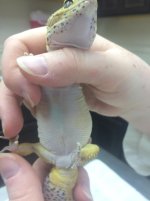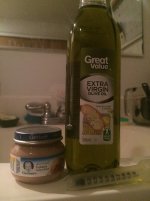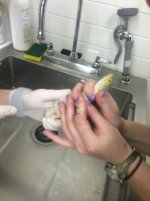Elizabeth Freer
Well-known member
Hi Bryan ~
What does Gabby's belly look like? Have you changed his powdered supplement schedule at all?
Can you see my post 138 directly above your last post?
~ ~ ~ ~ ~ ~ ~ ~ ~ ~ ~ ~ ~ ~ ~ ~ ~ ~ ~ ~ ~ ~ ~ ~ ~ ~ ~ ~ ~ ~ ~ ~ ~ ~ ~ ~ ~ ~ ~ ~ ~ ~ ~ ~ ~ ~ ~ ~
Here's why I recommend turkey baby food.
For short-term assist feeding ONLY
Turkey Baby Food versus Chicken Baby Food
View attachment 36678
Hemisphaeriodon gerrardii
Pink-tongued skink
/\ photo thanks to Michael Nesbit (May 2015)
The following info was provided by GU member Maurice Pudlo in December 2011. He's quite knowledgeable about nutrition.
"Turkey baby food is a milder food than chicken and thus provides less of a shock to the digestive system. The goal of assist feeding is not to overwhelm the gecko with nutrients.
"The recommended 1:1 ratio of turkey baby food (which is has a slightly higher water content than chicken baby food) to pediatric fluids (Pedialyte) helps quickly replace fluids and provides a mild dosage of nutrients that are more easily digestable than the more nutrient-dense chicken baby foods. [Fluid replacement at a veterinary clinic is often highly invasive procedure and should be avoided if at all possible. ???]
"Turkey is also lower in saturated fats as well as total fats. Fats are in both but the turkey diet after mixing contains just 3.1% where the chicken diet would have 3.95% (close to one percent higher in total fat content, of which a higher percentage is saturated fat).
"Turkey is slightly more mineral-rich than chicken (based on total ash content) and this may help with replacement of any lost due to a previously substandard diet.
"Turkey baby food contains 3 times as much total vitamin D (D2 + D3). This offsets its lower calcium levels. My opinion is that the calcium in turkey is more available than the calcium in chicken baby foods due to the higher level of vitamin D."
What does Gabby's belly look like? Have you changed his powdered supplement schedule at all?
Can you see my post 138 directly above your last post?
- Good on removing all the sand.
- Follow all the suggestions in post 138. They will work for Gabby now.
- Hopefully he'll continue to pass the sand a little at a time.
- Gabby's Monday appointment will be fine.
- Only feed Gabby Gerber's turkey baby food until all the sand has passed. Anything chitinous like crickets, mealworms, et cetera, might cause more backup.
~ ~ ~ ~ ~ ~ ~ ~ ~ ~ ~ ~ ~ ~ ~ ~ ~ ~ ~ ~ ~ ~ ~ ~ ~ ~ ~ ~ ~ ~ ~ ~ ~ ~ ~ ~ ~ ~ ~ ~ ~ ~ ~ ~ ~ ~ ~ ~
Here's why I recommend turkey baby food.
For short-term assist feeding ONLY
Turkey Baby Food versus Chicken Baby Food
View attachment 36678
Hemisphaeriodon gerrardii
Pink-tongued skink
/\ photo thanks to Michael Nesbit (May 2015)
The following info was provided by GU member Maurice Pudlo in December 2011. He's quite knowledgeable about nutrition.
"Turkey baby food is a milder food than chicken and thus provides less of a shock to the digestive system. The goal of assist feeding is not to overwhelm the gecko with nutrients.
"The recommended 1:1 ratio of turkey baby food (which is has a slightly higher water content than chicken baby food) to pediatric fluids (Pedialyte) helps quickly replace fluids and provides a mild dosage of nutrients that are more easily digestable than the more nutrient-dense chicken baby foods. [Fluid replacement at a veterinary clinic is often highly invasive procedure and should be avoided if at all possible. ???]
"Turkey is also lower in saturated fats as well as total fats. Fats are in both but the turkey diet after mixing contains just 3.1% where the chicken diet would have 3.95% (close to one percent higher in total fat content, of which a higher percentage is saturated fat).
"Turkey is slightly more mineral-rich than chicken (based on total ash content) and this may help with replacement of any lost due to a previously substandard diet.
"Turkey baby food contains 3 times as much total vitamin D (D2 + D3). This offsets its lower calcium levels. My opinion is that the calcium in turkey is more available than the calcium in chicken baby foods due to the higher level of vitamin D."
Last edited:







